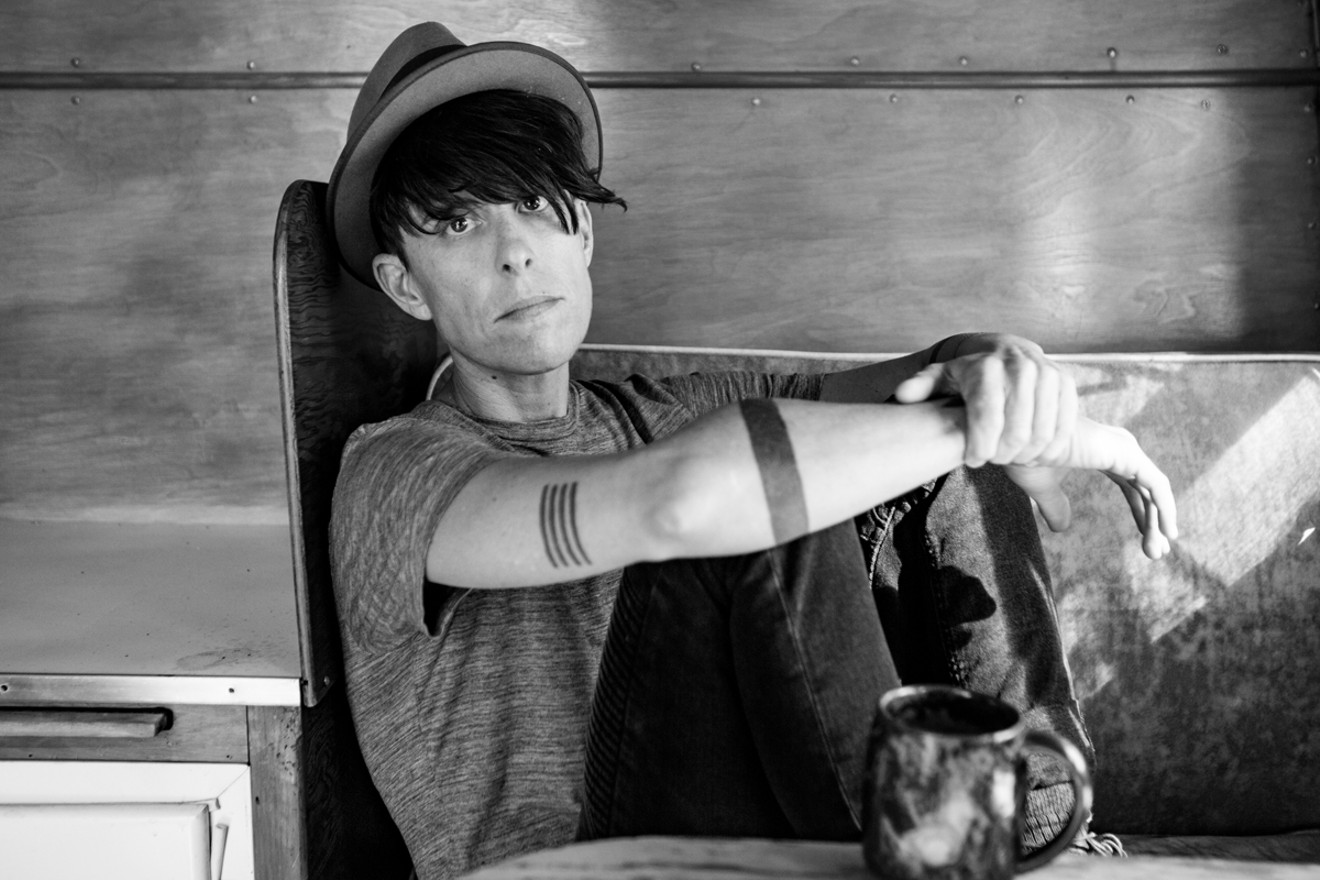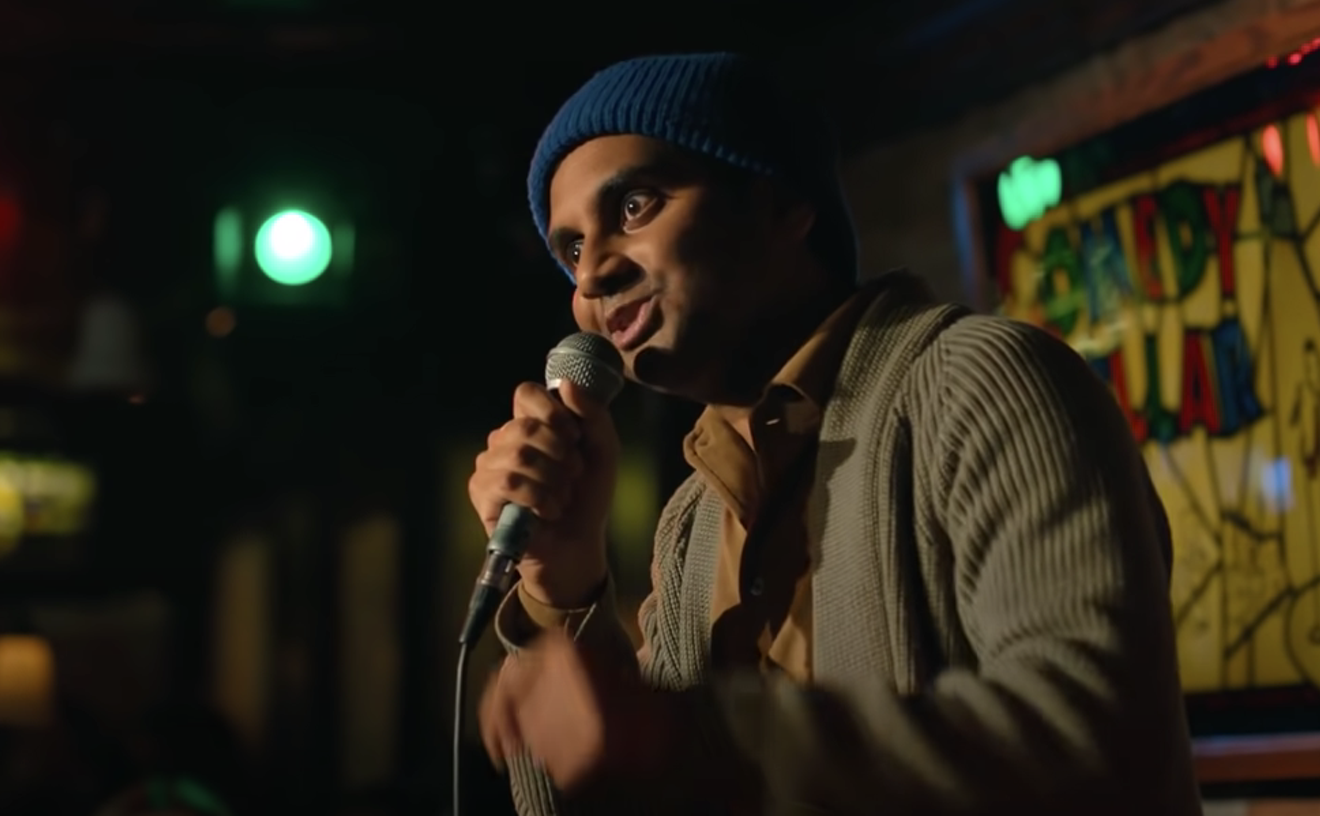Several Denver-area artists have championed the gun-violence prevention movement that took off after the shootings at Marjory Stoneman Douglas High School in Parkland, Florida, on February 14, 2018. Musician Nathaniel Rateliff and his Marigold Project have held workshops and donated to advocacy groups; the Americana singer even penned an op-ed about reforming gun laws. During the Crush Walls street-art festival last September, artist Matador painted a provocative mural depicting an assault rifle by the words “school” and “7:00 a.m. to 4:00 p.m., Thought & Prayer Expected.” And Front Range band Avifauna released a song taking on the National Rifle Association on the twentieth anniversary of the April 20, 1999, massacre at Columbine High School.
Now renowned Boulder-based spoken-word master Andrea Gibson has released a new video — produced by filmmaker Sarah Megyesy, with a soundtrack by Ani DiFranco — for the poem “America, Reloading,” which can be found in Gibson’s latest collection, Lord of the Butterflies. The video shows children scrawling images about fear with crayons as Gibson’s voice delivers words that are as complex as they are devastating, damning our nation’s feeble response to mass shootings. The poem describes America as a country that celebrates “the independence of machine guns,” “where anybody can buy a cemetery at a sporting goods store.”
The poet, who has long railed against wars, white supremacy, patriarchy and transphobia, says the project reflects a longstanding concern about gun violence, which Gibson obsessed over after moving to Colorado in 1999, shortly after Columbine. “I had friends who had spent that horrific day in the ER waiting room, waiting to see if their loved ones had or hadn’t survived,” Gibson recalls in an essay about the video. “As activist groups all over the state and nation rallied for gun reform, I remember feeling certain that the images of children crawling out of second story school windows in an attempt to escape gunfire would surely loosen the greed-grip of the NRA. I was wrong.”
In the two decades since Columbine, 187,000 students have experienced school shootings, Gibson says. The Washington Post, which maintains a database of school-shooting data, cites a higher number: 226,000.
“Valentine’s Day, the day our nation has historically celebrated love, is now known as the day an AR-15 stopped the hearts of seventeen students and staff members at a high school in Parkland, Florida,” Gibson continues in the essay. “As I write this, two survivors of that shooting as well as a father of a child murdered at Sandy Hook Elementary have died by suicide in the past week. Also in the last week, New Zealand has announced sweeping changes in their national gun laws in direct and immediate response to the white supremacist murders of fifty people at two Christchurch mosques, shining undeniable light on what could be, but hasn’t been, done here.”
Late last month, shortly after hundreds of area schools closed because of fears of another shooter, Gibson released a poem to remember Columbine and to make an emotional, lyrical plea for gun control now. Westword caught up with the poet over email to discuss the poem, how it will land on an already traumatized Front Range, and what it’s intended to accomplish.
Westword: Can you talk about when the poem was written and the process of writing it?
Andrea Gibson: I wrote the poem not long after the horrific shooting in Parkland, Florida. Though I’ve written many pieces in my life that were painful to write, this one, for a number of reasons, was the most difficult for me. I did a lot of research, and reading the detailed accounts of survivors, and the detailed accounts of family members of those who did not survive was devastating. Grief floods up each time I perform the piece live, and I’m consistently overwhelmed by how much more there is to speak, how many stories have not been heard, how many families and individuals are carrying unbearable loss within them while gun laws remain unchanged.
Denver-area schools shut down in April over the threat of gun violence. Our region is in a state of trauma. How do you expect this poem to land here?
That’s a tough question. For some context as to where I am coming from, I live in Colorado. Two of my housemates are teachers whose schools were closed due to threats, and one of them, my best friend, had been in the emergency waiting room twenty years ago supporting loved ones after the shooting at Columbine. The emotions involved in making a piece like this — in Colorado — became especially clear to me in the conversations I had with the parents of the students in the video: people whose hearts are the size of planets and who are desperate to create safer schools for their children. Upon deciding to take on this project, it was imperative to me to not make something that would be further traumatizing. I didn’t want to put anything on screen that would be terrorizing, as I’m aware of the specific impact that violence in films can have on the psyche. That said, Colorado is a community in grief over this issue, and a community living in fear, and I understand the video is not something everyone will be able to listen to and watch. I know the poem itself can be difficult to read. It was difficult to write, and it’s infuriating that it had to be written at all.
This poem and video are brutal reckonings in a time when many are already struggling to reckon with the seemingly endless stream of mass shootings. How do you hope people experience this poem and video — particularly people already living in a state of trauma?
As we are living in a time where the current administration is telling so many traumatizing lies, I tend to believe that even when truth isn’t hopeful, the telling of it is. I have always had a basic faith in the transformative impact of truth-telling, and that was what fueled the writing of the piece. The poem will be painful for many to hear, yes. But I can’t help but imagine how excruciating it is for survivors and the loved ones of people who did not survive to listen year after year to our cultural silence. To listen year after year to our politicians’ silence. The silence, I imagine, is unbearable.
A lot of people demand that art have some utility or function — particularly when it comes to political work. Do you hope this project has a particular function? Changing minds? Offering comfort? Unsettling people?
I think the video will land differently for different people. It’s my hope that it will inspire direct action, conscious organizing, and more informed discussions between people with varying opinions about the most compassionate way forward. It’s also important to me to simply keep this on people’s minds (and hearts). To turn our eyes in the direction of what is true, no matter how painful that truth is to face.
How are you planning on promoting this video? Will it be used to raise funds for gun-violence prevention groups?
We are putting the video out to raise emotional awareness around gun reform, knowing people’s minds don’t change easily but people’s hearts can change in an instant, and that is the power of art. I’m not paid very much, if at all, from video views, but in recent years I’ve donated a portion of tour revenue to causes dear to my heart, and this year’s donation will be split between two organizations doing powerful work: the National Compassion Fund and Everytown. If people would like to learn more about the work they are doing, or if they would like to donate, here are some links with more information: nationalcompassionfund.org and everytown.org
What are your thoughts on the Second Amendment and people who devote their lives to defending it?
In the face of the number of mass shootings our country has experienced in the last twenty years alone, in the face of much of our nation being almost continuously in mourning as a result, to dedicate one’s life to that cause is an act of extreme violence. I understand that individual motivation varies. Some people are motivated by greed and power, others by apathy, others by fear. But the result is the same: Our children are terrified to go to school. The place where they collectively learn has become a place where it is difficult to do so because of the fear. And our cultural heartbreak has been, thus far, endless.
[
{
"name": "Air - MediumRectangle - Inline Content - Mobile Display Size",
"component": "12017618",
"insertPoint": "2",
"requiredCountToDisplay": "2"
},{
"name": "Editor Picks",
"component": "17242653",
"insertPoint": "4",
"requiredCountToDisplay": "1"
},{
"name": "Inline Links",
"component": "18838239",
"insertPoint": "8th",
"startingPoint": 8,
"requiredCountToDisplay": "7",
"maxInsertions": 25
},{
"name": "Air - MediumRectangle - Combo - Inline Content",
"component": "17261320",
"insertPoint": "8th",
"startingPoint": 8,
"requiredCountToDisplay": "7",
"maxInsertions": 25
},{
"name": "Inline Links",
"component": "18838239",
"insertPoint": "8th",
"startingPoint": 12,
"requiredCountToDisplay": "11",
"maxInsertions": 25
},{
"name": "Air - Leaderboard Tower - Combo - Inline Content",
"component": "17261321",
"insertPoint": "8th",
"startingPoint": 12,
"requiredCountToDisplay": "11",
"maxInsertions": 25
}
]












